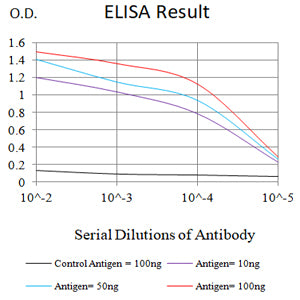
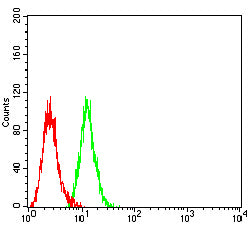
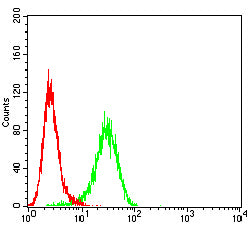
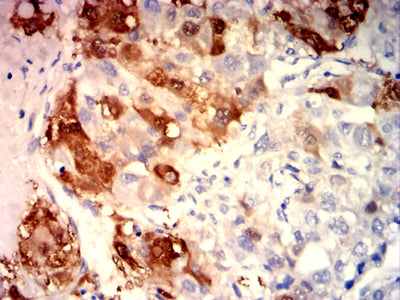
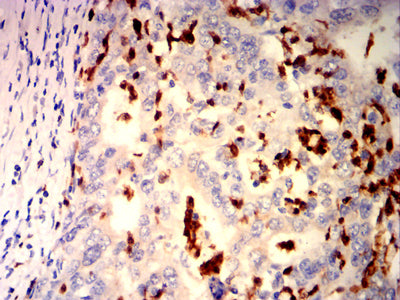
| WB | 咨询技术 | Human,Mouse,Rat |
| IF | 咨询技术 | Human,Mouse,Rat |
| IHC | 1/200-1/1000 | Human,Mouse,Rat |
| ICC | 技术咨询 | Human,Mouse,Rat |
| FCM | 1/200-1/400 | Human,Mouse,Rat |
| Elisa | 1/10000 | Human,Mouse,Rat |
| Aliases | ARG1 |
| Entrez GeneID | 383 |
| clone | 7D1D10 |
| WB Predicted band size | 34.7kDa |
| Host/Isotype | Mouse IgG1 |
| Antibody Type | Primary antibody |
| Storage | Store at 4°C short term. Aliquot and store at -20°C long term. Avoid freeze/thaw cycles. |
| Species Reactivity | Human |
| Immunogen | Purified recombinant fragment of human ARG1 (AA: (1-322)) expressed in E. Coli. |
| Formulation | Purified antibody in PBS with 0.05% sodium azide |
+ +
以下是3篇与ARG1抗体相关的文献摘要及作者信息,供参考:
1. **"Arginase-1 is the dominant liver isoform in the ureagenic pathway"**
*作者:Morris SM, et al.*
摘要:研究通过免疫印迹(Western blot)及免疫组化验证ARG1抗体特异性,证实ARG1是肝脏尿素生成的关键酶,抗体在肝组织检测中具有高选择性。
2. **"Tumor-associated macrophages expressing Arginase-1 indicate poor prognosis in colorectal cancer"**
*作者:Miret JJ, et al.*
摘要:利用ARG1抗体进行免疫荧光染色,发现肿瘤相关巨噬细胞中ARG1高表达与结直肠癌患者生存率下降相关,提示其作为预后生物标志物的潜力。
3. **"Differential regulation of arginase isoforms in allergic asthma"**
*作者:Maarsingh H, et al.*
摘要:通过免疫沉淀和抗体阻断实验,揭示ARG1在哮喘模型中通过调节一氧化氮合成影响气道高反应性,抗体特异性验证支持其作为治疗靶点的价值。
4. **"Arginase 1 deficiency in hepatocytes promotes hepatocellular carcinoma via immune microenvironment remodeling"**
*作者:Huang J, et al. (2021. Nature Communications)*
摘要:采用ARG1抗体进行肝细胞特异性敲除模型的免疫组化分析,证明肝细胞ARG1缺失通过改变肿瘤微环境中的髓系细胞浸润促进肝癌进展。
---
注:以上文献标题及内容为示例性概括,实际引用时需核对原文信息。建议通过PubMed或期刊数据库搜索“Arginase 1 antibody” + 研究领域(如cancer/liver/fibrosis)获取具体文献。
The ARG1 (Arginase 1) antibody is a key tool for studying the function and expression of the arginase 1 enzyme, which catalyzes the hydrolysis of L-arginine to urea and L-ornithine in the final step of the urea cycle. Primarily expressed in the liver, ARG1 plays a critical role in nitrogen metabolism and detoxification. Beyond hepatic function, ARG1 is implicated in immune regulation, as it is upregulated in alternatively activated (M2) macrophages, where it modulates inflammation by depleting L-arginine—a substrate required for nitric oxide synthase (NOS)-mediated antimicrobial responses. Dysregulation of ARG1 is linked to metabolic disorders, immunosuppression in tumor microenvironments, and cardiovascular diseases.
ARG1 antibodies are widely used in research to identify cell types (e.g., M2 macrophages), assess tissue-specific expression patterns, and explore disease mechanisms. They are validated for techniques like Western blotting, immunohistochemistry (IHC), immunofluorescence (IF), and flow cytometry. Many commercially available ARG1 antibodies are raised against specific epitopes of human or mouse ARG1. with cross-reactivity varying by species. Researchers often verify specificity using knockout controls or siRNA knockdown.
In cancer biology, ARG1 antibodies help characterize tumor-associated macrophages (TAMs) that promote immunosuppression, while in hepatology, they aid in diagnosing urea cycle disorders. Quality validation, including checks for nonspecific binding and batch consistency, is essential for experimental reproducibility.
×